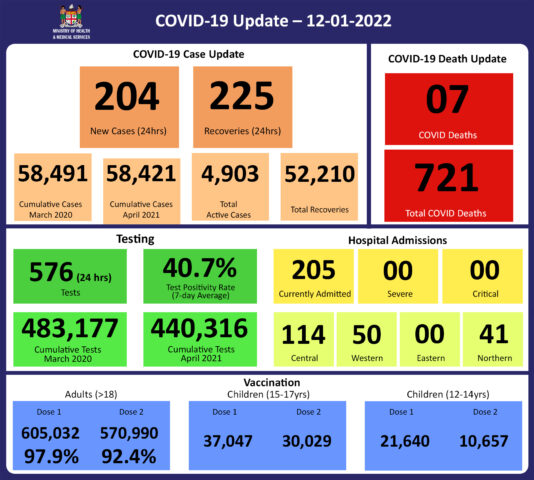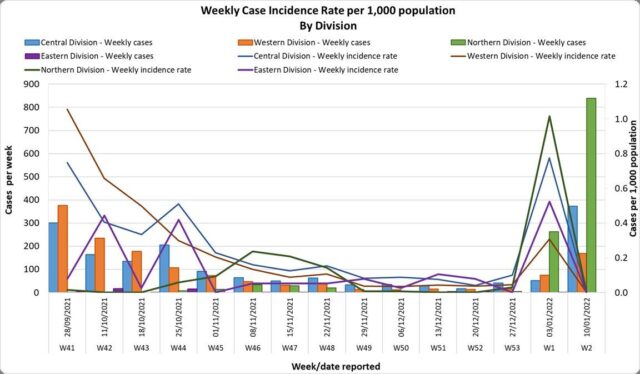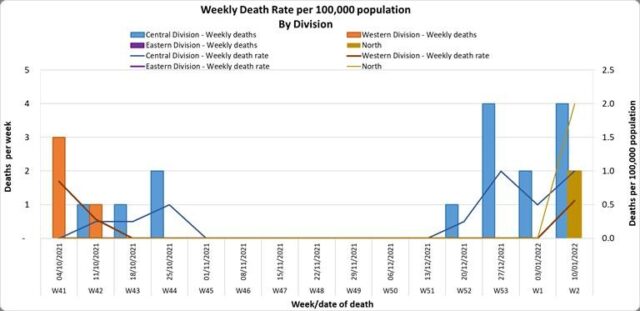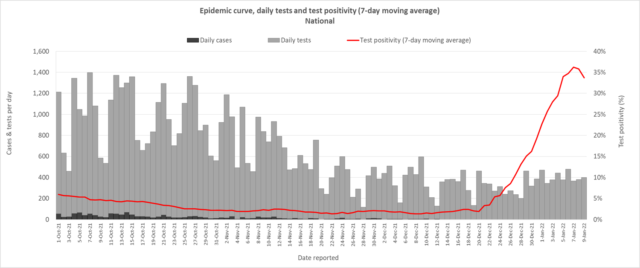Last Updated on 1 hour by Publishing Team
COVID-19 Situation Update
Wednesday, 12th January
| Transmission Update:
In the past 7 days until 11/01/2022, 1,124 new cases were recorded in the Central division, 841 new cases in the Western division, 12 new cases in the Eastern Division, and 188 new cases in the Northern Division. The Central Division cases constitute 69% of the cumulative total cases nationally, with the Western division making up 27%, 3% in the Northern Division, and 1% in the Eastern Division. Since the last update, we have recorded 417 new cases of which 213 new cases were recorded on 11/01/2022 and 204 new cases in the last 24 hours ending at 8 am this morning. Of the 417 cases recorded since the last update, 194 cases were recorded in the Central Division; 182 cases were recorded in the Western Division, 41 cases were recorded in the Northern Division, and nil cases were recorded in the Eastern Division. The national 7-day rolling average of cases as of 8th January is 418 daily cases. |
| Deaths:
This curve depicts the weekly death rate per 1,000 population by division since October 2021. Overall, the death rate graphs indicate an increase in the number of COVID-19 deaths in, Central, Western and Northern Division. There are seven COVID-19 deaths to report. The first COVID- 19 death to report is of a 53-year old male from the Western Division, who died at home on 03/01/2022. He had significant pre-existing medical conditions which contributed to his death. He was not fully vaccinated. The second COVID-19 death to report is of a 57-year old male from the Central Division, who died at the CWM Hospital on 07/01/2022. He had presented to the CWMH with shortness of breath and severe cough on 28/07/2022 and had been admitted. He had multiple pre-existing medical conditions which had contributed to his death. He was fully vaccinated. The third COVID-19 death to report is of a 73-year old male from the Western Division, who died at the Sigatoka Hospital Emergency Department on 07/01/2022. He had multiple pre-existing medical conditions. He was not vaccinated. The fourth COVID-19 death to report is of a 66-year old female from the Northern Division who died at home on 08/01/2022. She had pre-existing medical conditions. She was fully vaccinated. The fifth COVID-19 death to report is of a 57-year old female from the Central Division who died at home on 09/01/2022. She had pre-existing medical conditions and was fully vaccinated. The sixth COVID-19 death to report is of a 53-year old female from the Central Division who died at home on 10/01/2022. She was fully vaccinated. The seventh COVID-19 death to report is of a 73- year old female from the Central Division who died at home on 11/01/2022. She had a significant pre-existing medical condition and was fully vaccinated. There have been 721 deaths due to COVID-19 in Fiji. Please note that due to the time required by clinical teams to investigate, classify and report deaths, a 4-day interval is given to calculate the 7 days rolling average of deaths, based on the date of death, to help ensure the data collected is complete before the average is reported. Therefore, as of January 7th, 2022, the national 7 days rolling average for COVID-19 deaths per day is 2.0, with a case fatality rate of 1.32%. We have recorded 655 COVID-19 positive patients who died from serious medical conditions they had before they contracted COVID-19; these are not classified as COVID-19 deaths. |
| Hospitalisation:
Using the WHO clinical severity classification, a greater percentage, 69% (n=143) of the admissions of COVID-19 positive patients are categorized as asymptomatic and mild, 24% (n=49) are categorized as moderate and 6% (n=12) as severe with 1 case in the critical category. Anyone admitted to the hospital is tested before admission, therefore, a significant number of people are admitted to the hospital for non-covid health conditions, but incidentally, test positive due to the high amount of transmission in the community. The number of people being admitted because of COVID-19 remains low. |
Public Advisory:
As we continue to record new cases of COVID-19 throughout the country, the public is reminded of the need to maintain public health and social measures that are helping in suppressing the transmission of the virus in our communities so that hospitalization numbers remain low. When a large number of people get infected within a shorter period of time, even a smaller percentage of people becoming severely ill may still mean a large number requiring hospitalization, which will put pressure on our health system. Strict adherence to the community-wide COVID safe measures by everyone will ensure that we will continue to function socially and economically while the community transmission of the disease is sufficiently suppressed.
The public is also reminded that for now, we are prioritizing our testing to individuals at higher risk of severe disease to ensure that they are assessed early, referred to an appropriate health care facility, and managed promptly if their symptoms deteriorate.
If you develop a cold or flu-like symptoms such as runny nose, sneezing, nasal congestion, sore throat, cough, body ache, fever, you should assume you have COVID-19, and self-isolate. If you have any of these symptoms, please stay home to avoid spreading the disease to others, and in particular those who may be more at risk of severe disease. Get tested at your nearest health facility if you are at higher risk of severe disease so that health workers may conduct an assessment and place you on a care pathway for monitoring and follow-up. You are at higher risk of severe disease if you are over the age of 50, or have any significant chronic disease like heart disease, kidney disease, lung disease, diabetes, hypertension, or you are obese or pregnant. If anyone in your home is at higher risk of developing severe disease, please try to isolate yourself away from them.
As announced yesterday, the isolation period has been reduced to 7 days. You may stop isolating if
1. 7 days have passed since the start of symptoms or since the positive test (for asymptomatic cases)
AND
2. Your symptoms are improving, and at least 24 hours have passed since you had a fever (without the need to take fever-reducing medications like paracetamol)
Also, as announced yesterday, close contacts of cases are no longer required to isolate unless they develop symptoms. If you are a close contact and develop symptoms you must assume you have COVID-19 and self-isolate as described. A close contact is anyone who lives in the same house as a positive case, or has been in a confined space for at least 1 hour, or has come within 2 meters, or has had any physical contact, in the 2 days before the case’s symptoms started and up to ten days after.
Vaccination
The Omicron variant has been shown to evade immunity against infection in people who have been infected with previous variants, and those who have been fully vaccinated. This is why people who have been infected during the last wave, and those who have been fully vaccinated, are getting infected and having symptoms again in the third wave. The good news is that, while you still may get infected and develop symptoms, two doses of the vaccine still provide very good protection against preventing severe disease. However, vaccinated people over the age of 50 or those that have significant chronic diseases may still be vulnerable to severe disease. A booster dose significantly increases protection from symptomatic infection and strengthens protection against severe disease.
The booster dose program began at the end of November 2021, starting with frontline health and essential service workers. It was then opened up in December to everyone aged 18 and over. As of January 11th, a booster dose of the Moderna COVID-19 vaccine has been given to 39,179 people in Fiji. We encourage everyone aged 18 and over to get their booster dose when you are due, but especially if you are at higher risk of developing severe disease i.e. age over 50, or you have a chronic illness or you are pregnant or obese. You may receive your booster dose if it has been at least 5 months since your second dose of a COVID-19 vaccine. As of January, we have 142, 240 people due to receive the booster dose. Our current stocks of the Moderna vaccine, which is being used as the booster dose, are in excess of 100,000 doses. We are also expecting more of the Pfizer vaccine by the middle of this month.
COVID safe measures
The public is advised that strict adherence to personal COVID safe measures is very important in this 3rd wave. Wear a well-fitted mask that covers your mouth and nose when you are in public places and when attending gatherings. Avoid crowds and poorly ventilated spaces. Maintain at least 2 metres of physical distancing from others when outside your home. Wash your hands frequently with soap and water or use an alcohol-based hand sanitiser. Stay home and do not attend any gatherings if you have any symptoms of COVID-19. Get vaccinated if you are eligible and have not yet been vaccinated. And get a booster dose if you are over the age of 18, and especially if you are at higher risk of severe disease.
Preparing for adverse weather events
While preparing for the adverse weather conditions, the public is reminded to also prepare well for their health needs. Those who take medications regularly for chronic illnesses should ensure that they have an adequate supply of medications with them. All medicines kept at home must be kept in waterproof containers and in dry places away from children and safe from the elements. Families should ensure that the health needs of the vulnerable members of the family such as pregnant mothers, babies and children, the elderly, and the disabled are considered carefully, and plans in place for their safe and immediate evacuation to a health facility if the need arises during a climatic event.
It is important to remember that weather disturbances also cause the increase of climate-sensitive diseases such as leptospirosis, typhoid fever, dengue fever, and diarrhoeal diseases. The public is advised to take actions to protect themselves from these diseases and to prevent the spread of the diseases in our community.
Drinking water should be boiled if the color of the water turns turbid or the regular water supply is frequently interrupted. Stored water should be covered to protect against dirt and pests. Compounds and the home surroundings should be cleared of loose materials and debris that can injure individuals and attract pests. Household rubbish should be disposed of properly, and proper personal protective equipment should be used when outside the household. Children should also be advised on the health risks associated with bathing in flooded water around the home, and in flooded drains, creeks, and rivers, and be discouraged from doing so.




